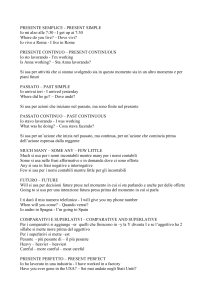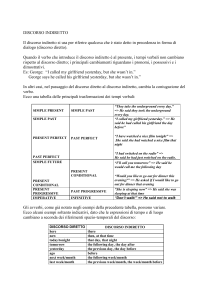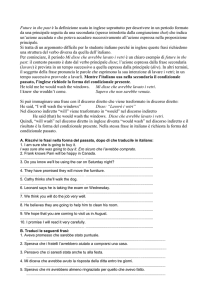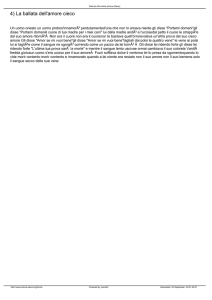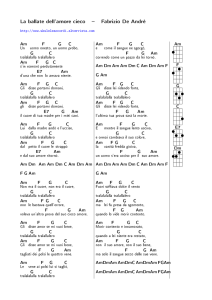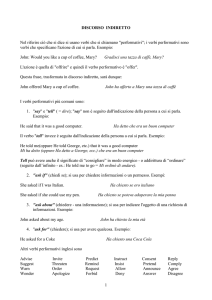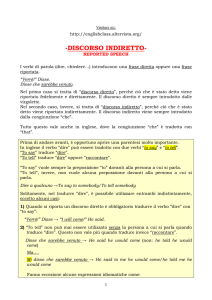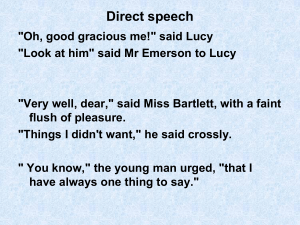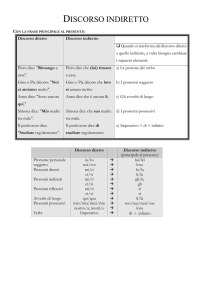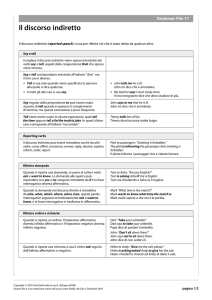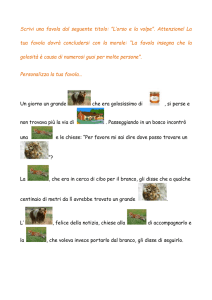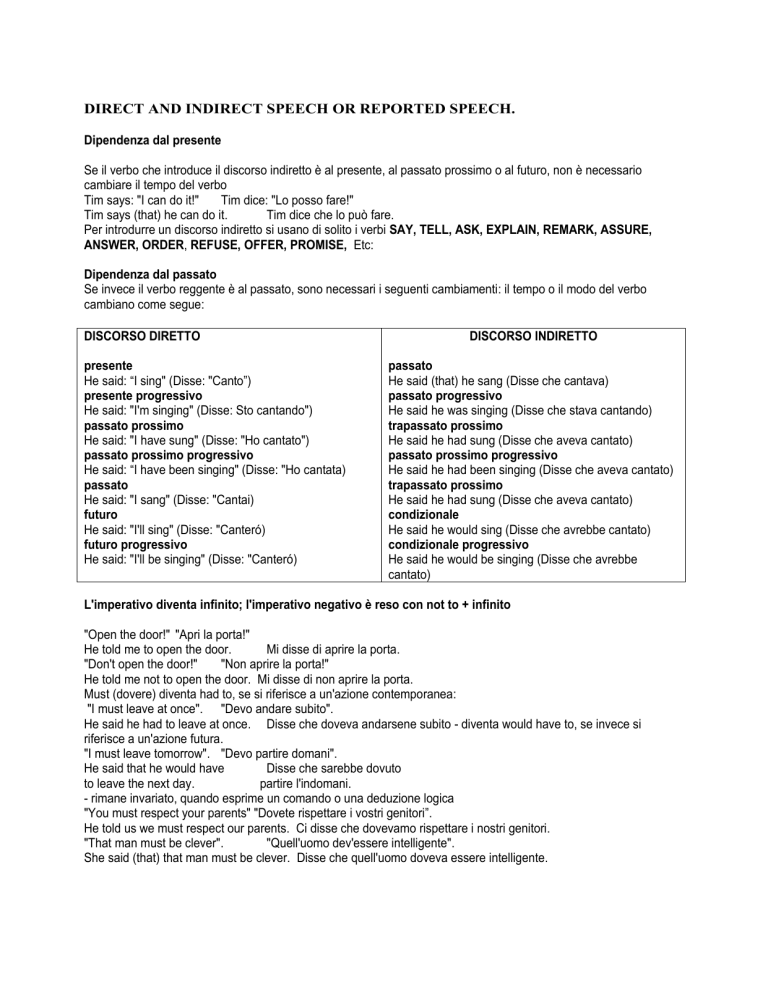
DIRECT AND INDIRECT SPEECH OR REPORTED SPEECH.
Dipendenza dal presente
Se il verbo che introduce il discorso indiretto è al presente, al passato prossimo o al futuro, non è necessario
cambiare il tempo del verbo
Tim says: "I can do it!"
Tim dice: "Lo posso fare!"
Tim says (that) he can do it.
Tim dice che lo può fare.
Per introdurre un discorso indiretto si usano di solito i verbi SAY, TELL, ASK, EXPLAIN, REMARK, ASSURE,
ANSWER, ORDER, REFUSE, OFFER, PROMISE, Etc:
Dipendenza dal passato
Se invece il verbo reggente è al passato, sono necessari i seguenti cambiamenti: il tempo o il modo del verbo
cambiano come segue:
DISCORSO DIRETTO
presente
He said: “I sing" (Disse: "Canto”)
presente progressivo
He said: "I'm singing" (Disse: Sto cantando")
passato prossimo
He said: "I have sung" (Disse: "Ho cantato")
passato prossimo progressivo
He said: “I have been singing" (Disse: "Ho cantata)
passato
He said: "I sang" (Disse: "Cantai)
futuro
He said: "I'll sing" (Disse: "Canteró)
futuro progressivo
He said: "I'll be singing" (Disse: "Canteró)
DISCORSO INDIRETTO
passato
He said (that) he sang (Disse che cantava)
passato progressivo
He said he was singing (Disse che stava cantando)
trapassato prossimo
He said he had sung (Disse che aveva cantato)
passato prossimo progressivo
He said he had been singing (Disse che aveva cantato)
trapassato prossimo
He said he had sung (Disse che aveva cantato)
condizionale
He said he would sing (Disse che avrebbe cantato)
condizionale progressivo
He said he would be singing (Disse che avrebbe
cantato)
L'imperativo diventa infinito; l'imperativo negativo è reso con not to + infinito
"Open the door!" "Apri la porta!"
He told me to open the door.
Mi disse di aprire la porta.
"Don't open the door!"
"Non aprire la porta!"
He told me not to open the door. Mi disse di non aprire la porta.
Must (dovere) diventa had to, se si riferisce a un'azione contemporanea:
"I must leave at once". "Devo andare subito".
He said he had to leave at once. Disse che doveva andarsene subito - diventa would have to, se invece si
riferisce a un'azione futura.
"I must leave tomorrow". "Devo partire domani".
He said that he would have
Disse che sarebbe dovuto
to leave the next day.
partire l'indomani.
- rimane invariato, quando esprime un comando o una deduzione logica
"You must respect your parents" "Dovete rispettare i vostri genitori”.
He told us we must respect our parents. Ci disse che dovevamo rispettare i nostri genitori.
"That man must be clever".
"Quell'uomo dev'essere intelligente".
She said (that) that man must be clever. Disse che quell'uomo doveva essere intelligente.
Gli avverbi e le locuzioni avverbiali di tempo e spazio cambiano come segue:
Nelle domande si ripetono gli interrogativi what, which, who ecc.; se nella domanda diretta ci si aspetta una risposta
affermativa o negativa, nel discorso indiretto si usa whether/if (se)
"What's the time?"
"Che ora è?"
He asked me what the time was. Mi chiese che ora fosse.
DISCORSO DIRETTO
DISCORSO INDIRETTO
here (qui)
now (ora)
this (questo)
these (questi)
today (oggi)
tomorrow (domani)
yesterday (ieri)
ago (fa)
the day after tomorrow (dopodomani)
there (là)
then (allora)
that (quello)
those (quelli)
that day (quel giorno)
the next (following) day (I'indomani)
the day before, the previous day (il giorno prima)
before (prima)
in two days' time (dopo due giorni)
Ecco una tabella delle principali trasformazioni dei tempi verbali:
SIMPLE PRESENT
SIMPLE PAST
SIMPLE PAST
PRESENT PERFECT
PAST PERFECT
“I have watched a nice film tonight” =>
She said she had watched a nice film that
night
“I had switched on the radio” =>
He said he had just switched on the radio.
PAST PERFECT
SIMPLE FUTURE
PRESENT CONDITIONAL
PRESENT
CONDITIONAL
PRESENT
PROGRESSIVE
IMPERATIVE
“They take the underground every day.”
=> He said they took the underground every
day.
“I called my girlfriend yesterday.” => He said
he had called his girlfriend the day before”
PAST PROGRESSIVE
INFINITIVE
“I’ll call you tomorrow” => He said he would
call me the following day.“Would you like to
go out for dinner this evening?” => He asked
if I would like to go out for dinner that
evening
“She is sleeping now” => He said she was
sleeping at that time
“Don’t walk!” => He said not to walk
I cambiamenti nei tre tipi di periodo ipotetico sono I seguenti:
First Type: DS: “If she comes, I will be pleased. (Azione possible). IS: He said that if she came
he would be pleased. (Disse che se fosse venuta sarebbe stato felice.)
Second Type: DS: “If she came, I’d be pleased.” (Azione Possibile). IS: He said that if she came
he would be pleased. (Disse che se fosse venuta sarebbe stato felice.)
Third Type: DS: “If she had come I would have been pleased”. (Azione non piu’ possible). IS:
He said that if she had come he would have been pleased. Disse che se fosse venuta sarebbe
stato felice.

